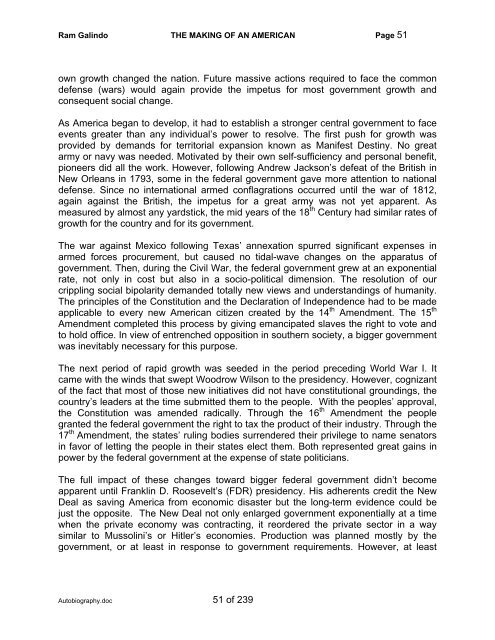Autobiography - The Galindo Group
Autobiography - The Galindo Group
Autobiography - The Galindo Group
You also want an ePaper? Increase the reach of your titles
YUMPU automatically turns print PDFs into web optimized ePapers that Google loves.
Ram <strong>Galindo</strong> THE MAKING OF AN AMERICAN Page 51<br />
own growth changed the nation. Future massive actions required to face the common<br />
defense (wars) would again provide the impetus for most government growth and<br />
consequent social change.<br />
As America began to develop, it had to establish a stronger central government to face<br />
events greater than any individual’s power to resolve. <strong>The</strong> first push for growth was<br />
provided by demands for territorial expansion known as Manifest Destiny. No great<br />
army or navy was needed. Motivated by their own self-sufficiency and personal benefit,<br />
pioneers did all the work. However, following Andrew Jackson’s defeat of the British in<br />
New Orleans in 1793, some in the federal government gave more attention to national<br />
defense. Since no international armed conflagrations occurred until the war of 1812,<br />
again against the British, the impetus for a great army was not yet apparent. As<br />
measured by almost any yardstick, the mid years of the 18 th Century had similar rates of<br />
growth for the country and for its government.<br />
<strong>The</strong> war against Mexico following Texas’ annexation spurred significant expenses in<br />
armed forces procurement, but caused no tidal-wave changes on the apparatus of<br />
government. <strong>The</strong>n, during the Civil War, the federal government grew at an exponential<br />
rate, not only in cost but also in a socio-political dimension. <strong>The</strong> resolution of our<br />
crippling social bipolarity demanded totally new views and understandings of humanity.<br />
<strong>The</strong> principles of the Constitution and the Declaration of Independence had to be made<br />
applicable to every new American citizen created by the 14 th Amendment. <strong>The</strong> 15 th<br />
Amendment completed this process by giving emancipated slaves the right to vote and<br />
to hold office. In view of entrenched opposition in southern society, a bigger government<br />
was inevitably necessary for this purpose.<br />
<strong>The</strong> next period of rapid growth was seeded in the period preceding World War I. It<br />
came with the winds that swept Woodrow Wilson to the presidency. However, cognizant<br />
of the fact that most of those new initiatives did not have constitutional groundings, the<br />
country’s leaders at the time submitted them to the people. With the peoples’ approval,<br />
the Constitution was amended radically. Through the 16 th Amendment the people<br />
granted the federal government the right to tax the product of their industry. Through the<br />
17 th Amendment, the states’ ruling bodies surrendered their privilege to name senators<br />
in favor of letting the people in their states elect them. Both represented great gains in<br />
power by the federal government at the expense of state politicians.<br />
<strong>The</strong> full impact of these changes toward bigger federal government didn’t become<br />
apparent until Franklin D. Roosevelt’s (FDR) presidency. His adherents credit the New<br />
Deal as saving America from economic disaster but the long-term evidence could be<br />
just the opposite. <strong>The</strong> New Deal not only enlarged government exponentially at a time<br />
when the private economy was contracting, it reordered the private sector in a way<br />
similar to Mussolini’s or Hitler’s economies. Production was planned mostly by the<br />
government, or at least in response to government requirements. However, at least<br />
<strong>Autobiography</strong>.doc 51 of 239


